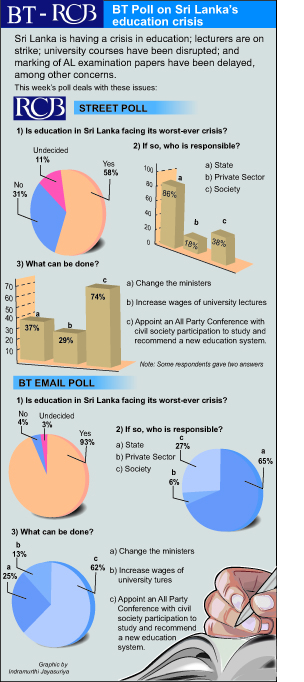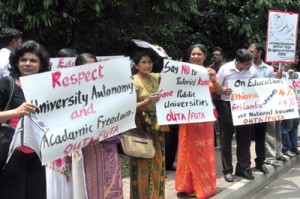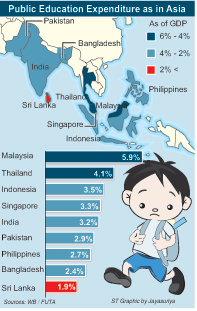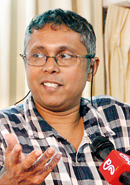State is responsible
This is certainly not the worst crisis in education. The worst in my mind was during the JVP insurgency in the late 1980’s.
On who is responsible – state, private sector or civil society?
 A combination of all three but primarily the state. Ultimately policy is in the hands of the state. And whether it be schools or the university some major changes need to be made. Having said that the private sector should lobby for a system that services their needs; while sultimately it is the society that is affected by the unemployment and the general dissent and dissatisfaction. More constructive contributions could and should be made.
A combination of all three but primarily the state. Ultimately policy is in the hands of the state. And whether it be schools or the university some major changes need to be made. Having said that the private sector should lobby for a system that services their needs; while sultimately it is the society that is affected by the unemployment and the general dissent and dissatisfaction. More constructive contributions could and should be made.
It’s the state that is responsible for policy formulation, investment and regulation. But of course the state can induce the private sector to invest in education subject to state regulation, particularly if it does not command sufficient resources and if the private sector finds setting up schools and universities a profitable venture. For this purpose the state has to be free of ideology and be practical; for instance, it need not cling to the impractical theory that education has to be free and be provided solely by the state. In fact it has to create the public awareness that if the educational needs of those who can pay could be looked after by the private sector, it (the state) would acquire more space to serve the needs of those who cannot pay.
On question three:
Changing the ministers and increasing salaries of the lecturers need to be done. But these are only mere solutions on the surface without treating the root cause. One needs to drastically take measures in chang the education syllabus both in primary, secondary and tertiary education in line with the developed economies. The graduate needs to improve not just academically, but an overall persona having proper communication skills, knowledge in English, IT and also increasing vocational training – e.g. hospitality and nursing have a severe shortage of workers.
Changing the ministers won’t make any difference; the new ones will continue to do the same or would be even worse. It is best to ‘educate ‘the education ministers.
Appoint someone with valid qualifications as ministers.
On increasing wages of university lecturers:
NO – Ask them to leave the country if they cannot (word at current wage levels). None of these people could find jobs outside as they are highly outdated with their knowledge. Very few will get jobs. Anyway there is a brain drain in all sectors. If you increase the wages what about other professions?
Increasing wages would certainly help as they appear to be grossly underpaid.
On a comprehensive review of the system by an All Party Committee;
Yes, these systems must be changed and we need a serious attitude change. Otherwise it will be the same.
De-politicise the system by having a good bureaucracy that can continue even if governments change.
Yes, this seems like the logical answer, but we have had All Party Conference structures in this way before – in other areas. But nothing’s come out of it.
A new system of education has to be formulated not by parliamentarians but by officials supported by experts in education in consultation with stakeholders such as entrepreneurs and parents; the politicians could be responsible for the preparation of policy, when it is ultimately submitted to them. This new system of education is long overdue. The delay could be due to the fact that the politicians do not actually care about the country or the people; they are obsessed with politics and power which corrupts; and “absolute power corrupts absolutely”. As for the officials, politicization has destroyed their morale and recruitment on the basis of political influence and not on merit has produced duds mostly.
The main objectives of the new system of education should be
(a) to produce the skills needs of an economy that can produce value added goods and services which can earn a higher quantum of foreign exchange to bridge the huge balance of payments deficit by satisfying the needs of discerning customers in the rest of the world, as the domestic market is too small to drive economic growth and (b) produce law abiding and hard working citizens. It should also aim at making teaching a prestigious and well-paid profession that is free of politicization, which is a virus that destroys; they (in fact all public officials) should be recruited and promoted solely on merit. Otherwise teachers will not be able to deliver the world class skills as well as the disciplined citizens that the country needs.
Education minister must be a professional
Remove those who kill education, reduce the influence of student unions.
Reduce interference by political parties. Changing ministers is not enough; the education portfolio must be given to a professional. If education is privatized it will keep them silent. It is they (ministers) who put politics first, who are responsible for this. One must solve these problems without setting the country on fire. The government must take the correct decisions.
6% allocation for education is meant for poor countries. We are at the top in Asia where education is concerned, Our primary secondary and tertiary education is free so these requests are meaningless.
The education system is much better than it was in the good old days like for example Black July (1983 and immediately after).
The wage demand should be granted.
There is no problem in education; some are only making up issues.
Education has not suffered during the last few decades, but today there are many issues; these are created by administrators. There is nothing wrong with education; it is the media that sets up issues with people.
People who voted for the present set of politicians must take the blame.
SB and Bandula must go home. The President is out of his mind to allow them (ministers) to upset education.
We all need to take this blame. It is we who voted them in.
There is no use protesting. The Inter-University Union is to blame and must be dealt with.
If the JVP is chased away education will be freed from the present impasse.
The issue is Nirmal Ranjiths (FUTA President) and not an educational issue.
Both undergrads and those seeking admission to universities are now at home and they can be of no use to our country. Politicians and administrators are the one who are killing education.
Fire the ministers, society to blame – people say
Firing the ministers, society must take the blame for voting governments (who do not deliver) into power, and de-politicising the bureaucracy were some of the suggestions that emerged from a joint Business Times (BT)-Research Consultancy Bureau (RCB poll on education.

Striking university teachers
Just as the Federation of University Teachers (FUTA) began discussions with the government and the Treasury on resolving long-term wage issues, the BT-RCB poll was launched by email and in interviews at two busy areas in Colombo. These joint polls in which the RCB plays a key role in undertaking street surveys in a scientific and well-structured manner have provided a range of views on national, social and economic issues which is useful to the government, private sector, civil sciety and students, for decision-making and acquiring knowledge.
The results of two polls while reaching unanimity in some issues however differed when it came to the vital question of “is there a major education crisis in Sri Lanka?” Some 93 per cent of email respondents said this was so while only 58 per cent in the RCB survey felt there was a crisis. The charts provide a detailed version of the poll and its results.
Follow @timesonlinelk
comments powered by Disqus




















